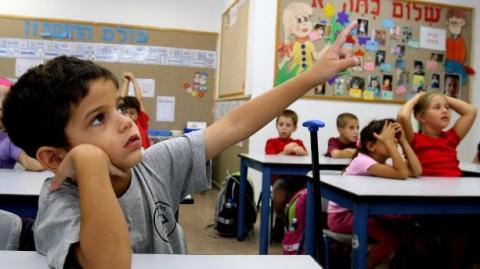Israel plans to outsource its flagship schools, educational projects
Ministry officials have told Haaretz that some of the work has already done by independent contract workers, but authority and supervision are still in the ministry’s hands. According to the tender, it “transfers the pedagogical work from educational professionals to the hands of a manpower company, which is expected to receive broad powers.” The work on the tender started during the term of the previous education minister, Shay Piron (Yesh Atid). It has been completed under his successor, Naftali Bennett.
The contractor will be required before each school year to prepare pedagogical position papers for the ministry’s research-and-development division. These papers will serve as the basis for decisions on the ministry’s directions for developing schools and programs, the tender states. The tender even includes details on what must be included in each position paper: “a survey of trends concerning pedagogical issues” from countries around the world, “an analysis of the existing situation in the Education Ministry,” “recommendations for directions for development,” and a proposal to conduct a pilot program in the schools.
A ministry official described this as “relinquishing the forming of policy. In the past we may have been helped by outside people in order to gather scientific materials and write position papers, but that was through the chief scientist and under his supervision. In comparison, the new tender has almost no involvement of ministry staff.” According to the official, “The choice of the experts was never virtuous. It reflects an educational-social-political approach. Until now it was our responsibility. Now a contractor company will be responsible for it, and the considerations that guide it are more economic than educational — but no one will know that.”
Another ministry official wondered why the ministry had outsourced the writing of the position papers and did not choose a university or school of education to do so. Very few private companies meet the minimum conditions for the tender, and these firms are already involved in many contracts with the ministry — many of which are renewed annually.
The tender’s three areas sometimes overlap and are considered part of the core of the Israeli educational system. For example, experimental schools try to innovate new methods for schools to operate, whether in their broad range of subjects or the various ways they work. The Education Ministry has considered these experimental schools educational trailblazers and has supported them both pedagogically and financially. There are some 130 such schools in Israel today, and some 50 knowledge centers. The contractor will “accompany and implement the plans [for experimental schools] while conducting follow-up, supervision and evaluation of the activities,” the tender states.
This means it may be possible for the private contractor to both develop and supervise the experimental schools’s programs, and thus set public policy. The process of evaluating these schools and the knowledge centers includes not only budgetary factors but also matters such as “the quality of the pedagogical model,” the tender states.
Today some of the support provided to these experimental schools is done by outside contractors, similar to the provision of position papers today. But the process is still supervised by the Education Ministry. According to the tender, the contractors’ employees who carry out the work will not be allowed to work in the Education Ministry or use any of its resources. This also forbids them from using the ministry’s official letterhead. “To remove any doubt, it is stated and agreed that the relations between the contractor and the government do not create an employer-employee relationship,” the tender states.
The Education Ministry said the tender was designed to allow for the receiving of services from experts in their fields. “It should be emphasized that the sole responsibility for pedagogical action in the regional program for the choice [of schools] and the experimental schools is the responsibility of the Education Ministry,” it said in a statement.
Or Kashti

